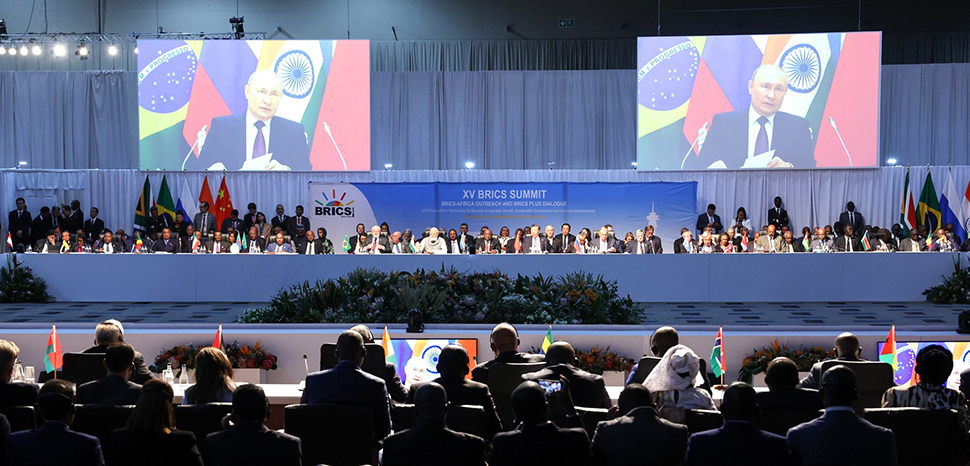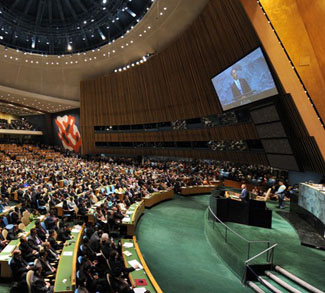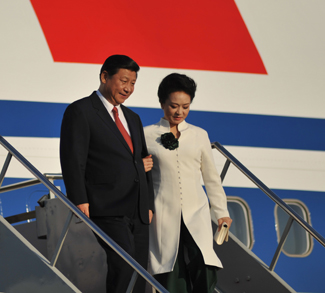An ascendant BRICS—Brazil, Russia, India, China and South Africa—has now reached new heights, ranking as a geopolitical force for the West to reckon with at the cusp of and in the seemingly emergent multipolar international order.
If gaining greater global standing is a measure of power, the expansion of the BRICS group to include the likes of Argentina, Egypt, Ethiopia, Iran, Saudi Arabia and the United Arab Emirates will likely give the grouping a leg up in taking the US/Western-led liberal international order to task, along with the global governance-related scheme of things.
Much of the criticism levelled at the BRICS group misses this point.
Yet, the group is under no illusion about its unmet leadership potential in the international pecking order. Given the role of hierarchy in international politics—whose “systems are … intrinsically political [either turning on] a relationship of legitimate authority [or] as intersubjective manifestations of organized inequality”—the group’s Global South constituency is looking to address its liminality in that vein.
If the tone of some of the most prominent voices contesting “the West’s geopolitical dominance” is any guide—or, put differently, given the full extent of ostensibly Global South-related leadership hands at work—a post-Western global order is seemingly in the cards for a constituency of countries.
The XV BRICS Summit held in South Africa from August 22nd to 24th, 2023 lends to and reinforces this view.
Moreover, what has also come into focus for BRICS watchers is the outsized role of respective BRICS members regarding the September 9th to 10th India-helmed, developing world-oriented G20 summit.
Note should be taken that, historically, the emergence of the G20 is tied to global responses to the Asian financial crisis of the late 1990s. Accordingly, both in its form and function, a strong economic dimension permeates the group. Indeed, by the late 2000s, the G20 had established itself as a leading intergovernmental forum for international economic cooperation, boasting an expanding agenda and the incorporation of leader-level summits.
Up until the recent admission of the African Union to the G20 as a permanent member, it stood as a grouping of 19 countries and the European Union; altogether, constituting the world’s largest economies. Traditionally, according to some observers, its Western members wielded virtually unchecked power over others.
Apparently, and owing to the considerable influence of respective members of the BRICS group, this latter dynamic and the carefully crafted image that has held it up for years are under challenge.
Indeed, European leaders worry about the West’s waning influence internationally.
In all of these respects, the G20 presidency under India—which recently handed over the reins to Brazil—has further chipped away at the Global North’s leadership narrative. Already under stress, it is seemingly giving ground to other narratives. Not the least of these is that the G20 is now part and parcel of the BRICS group’s power play for “global prominence.”
But the true lesson of the G20 summit under reference, when viewed through a BRICS-related prism, is that—fundamentally—what exactly that play is and how that prominence is defined are not indicative of a unified narrative across/in the group.
Take, for example, the case of Russia. Adopted by consensus, the G20 New Delhi Leaders’ Declaration—insofar as it “avoids” condemnation of Russia’s hand in the Ukraine war—lends itself (at least in the Kremlin’s mindset, calculation and public diplomacy) to Russia’s wider foreign policy ends.
Going into the summit, the Kremlin had the narrowest of priorities (but a no less consequential geopolitical play for prominence in its diplomatic sights), and the ugly truth is it succeeded on that score.
The G20’s top-tier advanced economies—which make up another group called the G7 (having traditionally played a leading role in the coordination of key aspects of global policy), whose prestige has been called into question—took a calculated risk in settling for such curbs on language in requisite, behind the scenes G20 declaration-related negotiations.
Ultimately, they came up short, against a geopolitical backdrop where security analysts are increasingly calling out the West for its part in Kyiv’s “stalling” counter-offensive to retake Russian occupied Ukrainian territory.
In sum, the BRICS group’s expanding influence in international politics has taken the diplomatic world by storm, against a background of those emerging nations having come into their own in the last few years.
But a reality check is in order for developing countries’ foreign policy practitioners.
The clincher is with regard to how and to what end the BRICS group did just that is revealing of the sizeable degree to which respective national interests—and not the greater collective’s much vaunted interests per se—are the driving forces behind the BRICS project(s). At the very least, this takes some of the shine away from the much-hyped mythology of the ‘Bandung Spirit’ tie-in to a so-called ‘BRICS Spirit’ and, by extension, the rhetoric of a common qua shared post-Western global order-related vision.
The views expressed in this article belong to the authors alone and do not necessarily reflect those of Geopoliticalmonitor.com.
The author would like to thank Ambassador Riyad Insanally for his generous and insightful advice on an early version of this article, as well as his engaged commentary on related work. Special thanks to Ambassador David Hales for perusing an earlier draft of this article and for wide-ranging discourse, which shaped the author’s perspective on underlying themes. The author is especially grateful to Ambassador Patrick I. Gomes for his incisive feedback, openness and encouragement regarding his scholarship, which also benefits from Ambassador Colin Granderson’s input.




